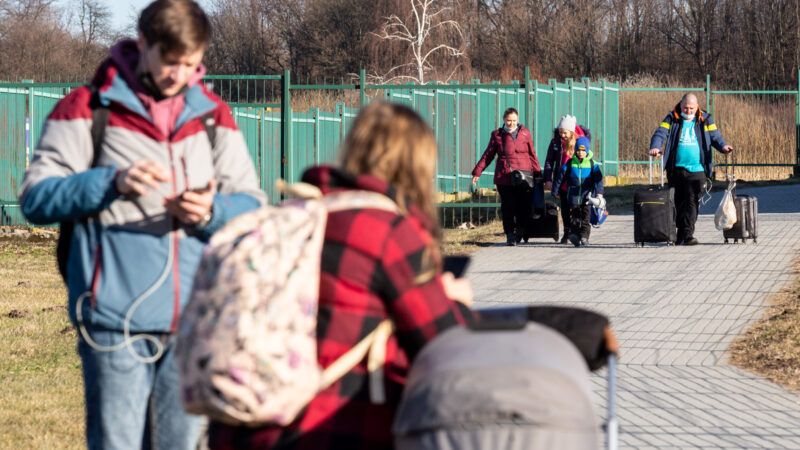If Moldova Can Welcome Ukrainian Refugees, the U.S. Can Too
Europe's poorest country is stepping up to help Ukrainians. Time for the U.S. to do the same.

After building up a troop presence on the Ukrainian border in recent months, Russia has launched an invasion of Ukraine. Today, Russian forces began carrying out strikes on major cities and strategic locations across Ukraine. The chaos has already prompted an exodus of Ukrainian citizens. Scenes from Kyiv show a flood of cars departing the capital city, and evacuees are already arriving in neighboring Poland, Romania, and Slovakia.
"We are ready to help all those who will be forced to leave Ukraine," said Polish Defense Minister Mariusz Blaszczak. "We could receive over 500,000 refugees," reported Romanian Defense Minister Vasile Dincu. "That is…the number for which we have prepared." Slovak Defense Minister Jaro Nad told Al Jazeera that his country was preparing for the potential "large numbers of refugees" coming to Slovakia.
One of the most enthusiastic helping hands has come from Moldova—Ukraine's southern neighbor and Europe's poorest country.
Moldovan President Maia Sandu said that over 4,000 Ukrainians have already crossed into Moldova today and that the country's "borders are open for [Ukrainian] citizens who need safe transit or stay." Moldova is prepared to help fleeing Ukrainians "in their humanitarian needs," she expressed.
Much like Ukraine, Moldova gained independence from the Soviet Union in 1991 and has struggled since then economically. The two countries both face ongoing territorial provocations from Moscow—Ukraine with Crimea and the Donbas region, and Moldova with the Russia-backed separatist government in Transnistria. Though it has comparatively few resources to get the job done, Moldova is stepping up to welcome Ukrainians fleeing the conflict.
Ukraine's neighbors have a history of shared struggles against the Russian government and are home to large Ukrainian expatriate populations, making their willingness to help sensible. The United States may be geographically far-flung from the conflict in Ukraine, but its own Ukrainian population, desire to protect those oppressed by the Russian government, and humanitarian concerns should guide its policy toward fleeing Ukrainians.
The U.S. has long accepted Ukrainians fleeing difficulties at home, accepting them consistently and in large numbers since the late 1870s. Ukrainians have flourished in communities across America. More than 1 million Ukrainians live in the U.S. and many have relatives in their ailing motherland they theoretically could sponsor for family-based visas. But the American immigration system is severely backlogged, keeping these and many other vulnerable people around the world in danger. Wary of direct military involvement on Ukraine's part, the Biden administration should concentrate its efforts on providing effective and speedy escapes to Ukrainians fleeing danger and protecting them from removal once they arrive here.
Countries with far fewer resources than the U.S. are gladly opening their doors to Ukrainians in their time of need. The fate of Ukraine is unwritten, and the brutal scenes emerging from the country could very well worsen. As citizens flee the Russian invasion, the U.S. should step up as Ukraine's neighbors have.


Show Comments (48)